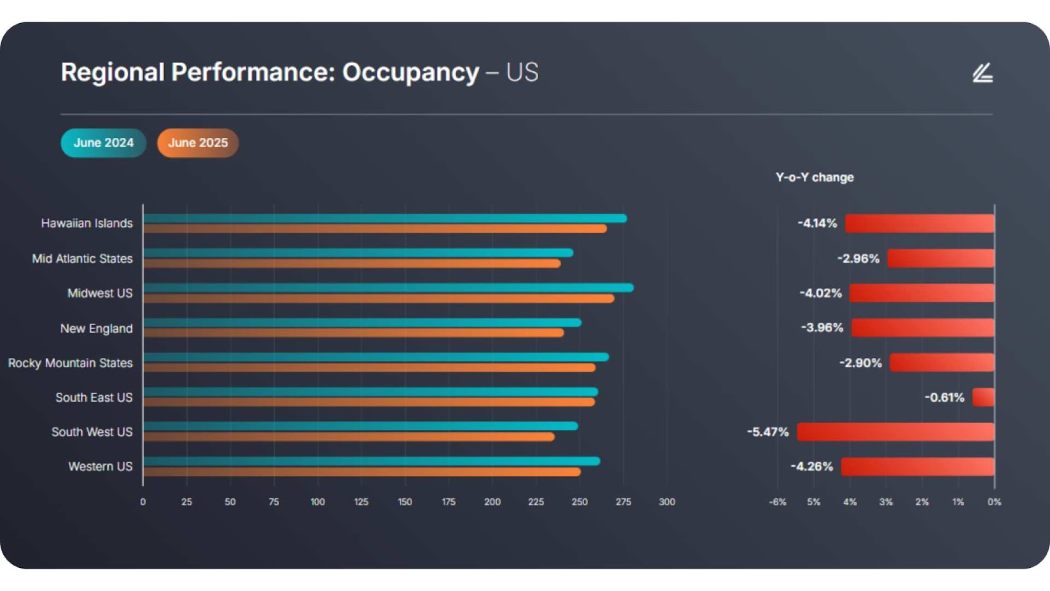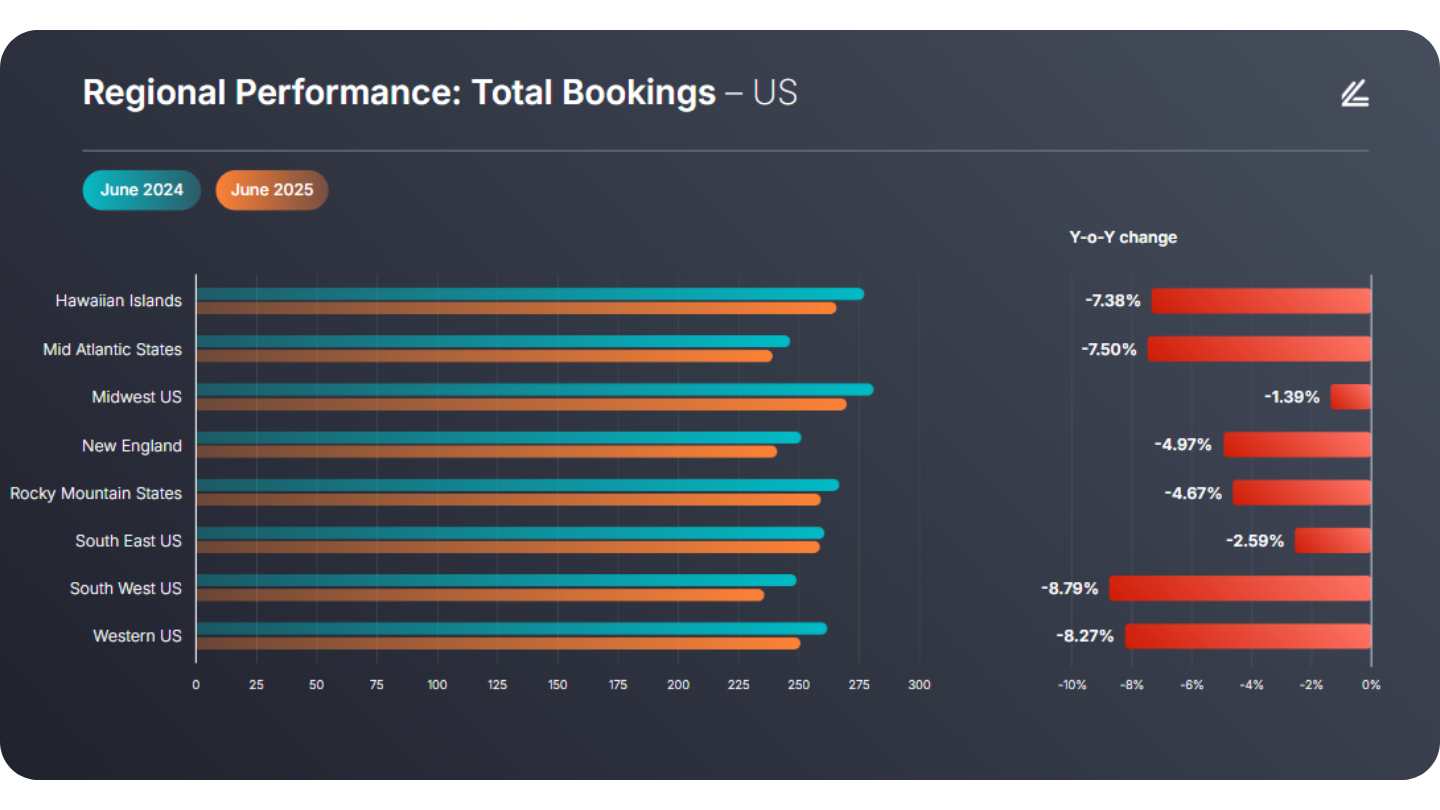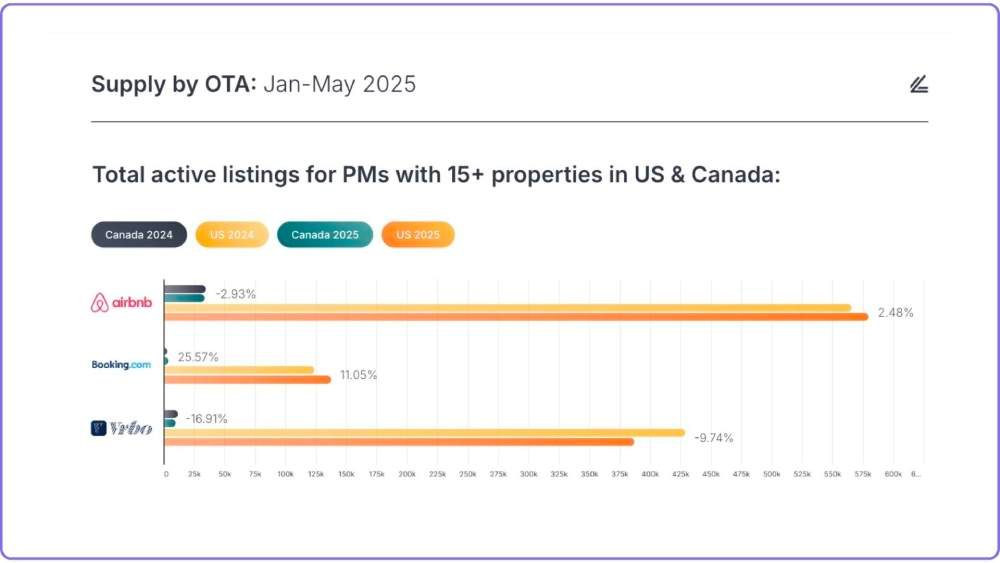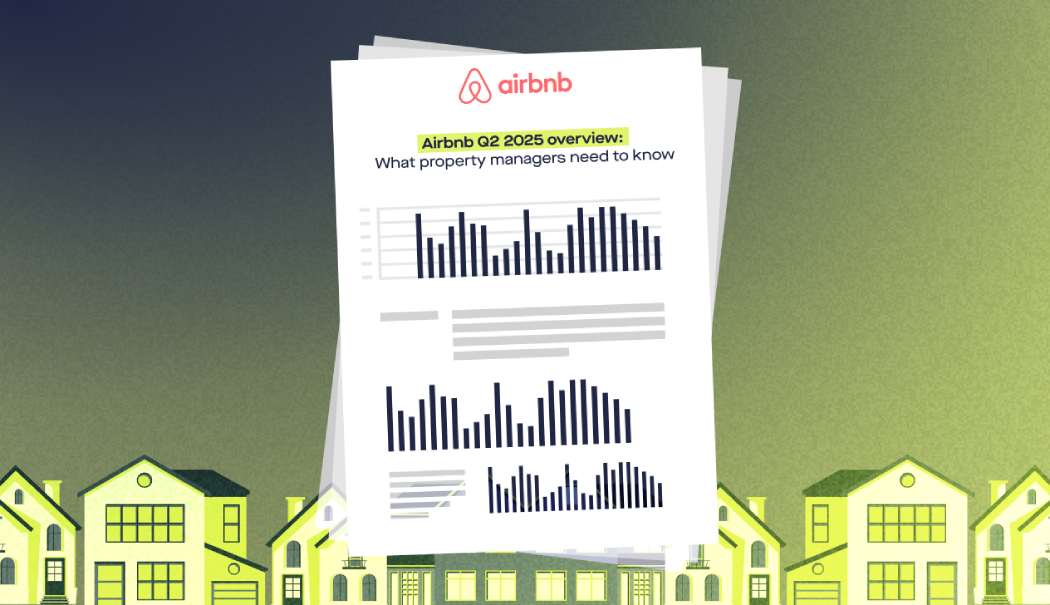The latest Airbnb earnings call (Q2 2025) delivered another set of impressive numbers: revenue climbed to $3.1 billion (+13% YoY), nights booked rose 7%, and Gross Booking Value (GBV) rose by 9%. By headline measures, Airbnb’s momentum looks unstoppable.
But for property managers, the picture is more complex. Supply of listings grew ~8% YoY, outpacing demand growth of 7%. That means more properties are competing for the same pool of guests. When the “booking pie” gets cut into smaller slices, occupancy per listing slips and many managers are already feeling it.
STR occupancy is going down: every booking matters more
Occupancy is where reality bites. National averages are down to ~50%, compared to 57% in 2024. In today’s climate, 55% occupancy is now considered “good,” a big shift from historical benchmarks.

- Hawaiian Islands: occupancy down 4.1% (lagging international recovery + higher travel costs).
- Southwest U.S.: occupancy down 5.5% (domestic seasonal markets under pressure).
Why Airbnb shows growth while U.S. bookings decline
Looking at the booking data for June 2025 we can also see a steep decline compared to last year. With some regions seeing a decline of over 8% in bookings. Meaning that the future occupancy is not looking great for the rest of the summer either.
- Southwest U.S.: -8.8%
- Mid-Atlantic States: -7.5%
- Hawaiian Islands: -7.4%
- Midwest U.S.: -1.4%
One contradiction stands out: Airbnb reports global growth, yet Lighthouse data shows U.S. booking declines across nearly every region comparing June 2024 to June 2025. Given the short bookings windows this summer, it projects the softness experienced in Q2 to continue during the beginning of summer.

The reason? Growth is driven by international markets. Brazil, Japan, and Germany posted double-digit gains, while U.S. demand softened under economic uncertainty and tighter regulations. The result: Airbnb’s global revenue growth is real, but it’s unevenly distributed. For U.S.-based property managers, conditions are far tighter than the top-line numbers suggest.
The forces reshaping short-term rentals in 2025
Inflation and high interest rates continue to strain household budgets, leaving families with less to spend on travel. Guests are choosing shorter, drive-to trips instead of week-long vacations, while many are postponing or canceling travel altogether. Booking windows are shrinking too, as travelers wait until the last minute for deals, making occupancy harder to predict.
In addition, the supply of rentals across major OTAs is shifting significantly. Lighthouse data shows that even after removing more than 400,000 listings, Airbnb’s U.S. supply still grew by nearly 2.5%. By contrast, Vrbo saw its supply drop more than 9% year over year. This suggests that while overall global demand is softening, Airbnb may be capturing share from competitors, helping explain why its bookings are still climbing.

Strategies to protect and grow revenue in Q3 and beyond
The U.S. short-term rental market in 2025 is a paradox. Airbnb’s global numbers are up, but Lighthouse data shows bookings sliding in many American regions. In this environment, protecting revenue is less about riding the wave and more about building resilience into your operations. Here’s how to do it.
1. Diversify beyond Airbnb
Airbnb’s Q2 growth partly reflects shifts in market share, its gains have come while Vrbo’s supply shrank. For property managers, this highlights a key risk: if your portfolio is tied too closely to a single channel, you’re vulnerable when demand swings.
A diversified channel strategy ensures you capture bookings no matter which OTA is gaining share. For example, in markets where Vrbo listings have dropped, Airbnb and Booking.com are absorbing that demand. By distributing across Airbnb, Booking.com, Vrbo, and direct channels, you maintain market reach and stabilize performance even when one platform underperforms. This isn’t just about hedging risk, it’s about staying visible wherever the demand flows.
2. Optimize Airbnb visibility
If running multiple channels feels overwhelming, there’s another path: double down on winning within Airbnb itself. The truth is, visibility on Airbnb isn’t luck, it’s the result of aligning with the factors the algorithm rewards.
Airbnb’s search algorithm is designed to surface listings that are most likely to convert into satisfied guests. That means hosts with strong guest satisfaction, competitive pricing, and well-optimized listings consistently outperform those who rely on looks alone.
Here’s how property managers can take a data-driven approach:
Mobile-first content
With 59% of Airbnb bookings happening on mobile, your first three photos matter more than ever. They should be high-resolution, bright, and instantly communicative of value (think: ocean view, hot tub, or proximity to a landmark).
Descriptions need to be scannable. Lead with value propositions, “Steps from Main Street,” “Ideal for family getaways,” “Pet-friendly with fenced yard”, instead of burying them halfway down.
Event-driven demand
Airbnb’s partnerships with the Olympics, FIFA, and Tour de France prove how powerful event-driven demand is. Guests flock to these destinations for specific dates, and Airbnb prioritizes listings that acknowledge it.
Property managers who reference local events in descriptions and adjust pricing windows see visibility gains because they align with how guests are actually searching.

Ranking signals that matter most (based on correlation studies):
- Guest satisfaction (0.906 correlation): It’s not just reviews, Airbnb checks descriptions with guest feedback to test whether expectations match reality. Inaccurate descriptions hurt ranking, even if reviews are “good.” So make sure not only your guests are happy during their stay, but adjust your descriptions based on the guest feedback to increase your accuracy.
- Absolute price (0.901): Competitive pricing relative to your submarket drives both clicks and conversion. The algorithm wants guests to feel they’re getting fair value. A strong revenue management strategy is crucial here.
- Listing word count (0.897): More detailed, relevant descriptions improve both ranking and conversions. Guests who can picture themselves in your property are more likely to book.
- Calendar activity (0.884): Frequent updates (even minor ones) show the algorithm your listing is actively managed. Stale calendars fall down the ranks.
This is where AutoRank becomes valuable. Instead of relying on instinct, it updates titles, descriptions, and highlights dynamically, matching what real guests are searching for at that moment. That means your property stays aligned with Airbnb’s evolving ranking signals without you manually rewriting copy every week. Think of it as having a data scientist fine-tuning your visibility in the background.
3. Use data to carve out your niche
Occupancy averages don’t tell the whole story. Within the same city, some neighborhoods outperform because of better event calendars, stronger midweek demand, or unique amenities. Managers who thrive in 2025 will be the ones zooming into these micro-trends.
- Monitor comps weekly, not quarterly. A competitor who adjusts pricing every weekend can undercut you before you notice.
- Test revenue management, not just dynamic pricing. Dynamic pricing reacts to demand, but revenue management plans for it, adjusting minimum stays, aligning with local events, and forecasting seasonality.
- Align with niches guests care about. Pet-friendly, work-from-home ready, family-oriented, the categories Airbnb pushes are also the ones guests search for.
The takeaway
The Airbnb Q2 2025 earnings call makes one thing clear: the platform is growing, but property managers are playing a tougher game than the headlines suggest. Global growth masks U.S. softness. More listings mean more competition.
Thriving in this climate requires moving past passive hosting. Diversify your channels. Treat visibility like a science, not a guess. Use tools and data, to stay aligned with what the market and the algorithm are rewarding.
Property managers who adapt this way won’t just survive Q3. They’ll position themselves as the ones who consistently outperform while others scramble to keep up. For advice on how to outperform your competition as a property manager, you can book a free call with our experts and find out how we can help you.


